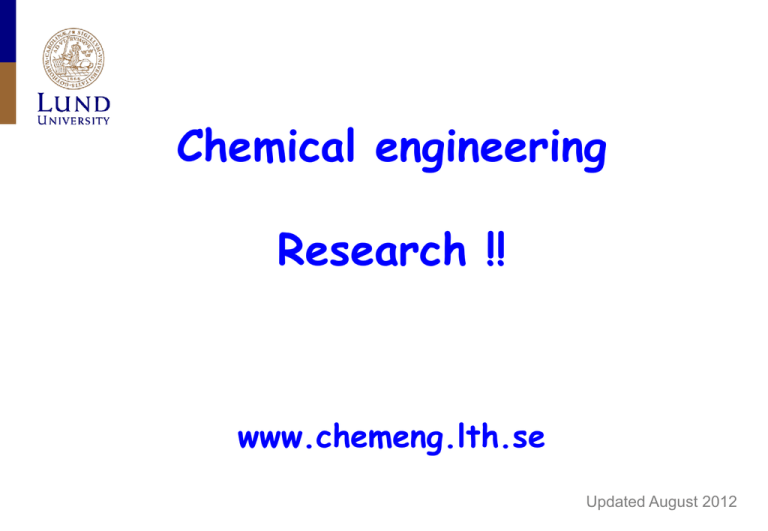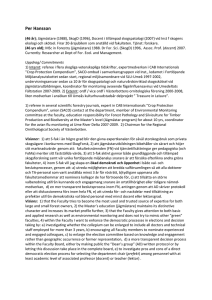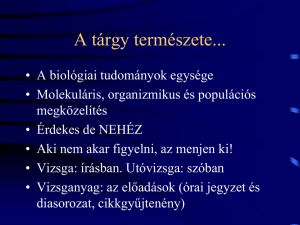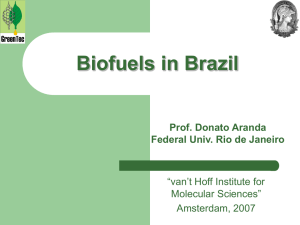Översikt - Kemiteknik
advertisement

Chemical engineering Research !! www.chemeng.lth.se Updated August 2012 Biomass to Biofuels (Guido Zacchi, Mats Galbe, Ola Wallberg) Biomass Dehydration Ethanol SSF Enzymatic Hydrolysis Pretreatment Fermentation Distillation Stillage Yeast cultivation Sep Liquid Lignin CHP Heat & Power AD Biogas WWT Sludge Opportunities & R&D needs High yield High concentration High productivity Low catalyst dosage No waste Improved hydrolysis of biomass Pretreatment Enzymatic hydrolysis Improved fermentation Yeast Fermentation technology Hydrolysis Process integration Consider the whole integrated process incl AD/WWT – re use water External integration With 1G ethanol, CHP, pulp and paper etc Assessment by techno-economic analysis 100% Energy efficiency 5 scenarios 90% 70% DH (process) DH (FGC) DH (steam cycle) Electricity Pellets Ethanol 60% 50% 40% 30% 20% 10% 0% A B C D Prod cost E 5,00 4,80 4,60 Ethanol production cost (SEK/L) Energy efficiencyLHV 80% 4,40 4,20 4,00 3,80 3,60 3,40 3,20 3,00 A B C D E Pretreatment & hydrolysis (Gunnar Lidén) 200 μm Surface morphology and chemistry changes in the pretreatment giving a changed reactivity Fermentation Genetic factors Environmental factors Feedstock Pretreatment Pentoses, phenolics, carboxylic acids, degradation products (furans), other inhibitors SSF Process water Hydrolysis Salt (from neutralization) Hexoses Fermentation High temperature (SSF) Nutrient depletion Ethanol Microbial contamination Separation Lignin & other residues Xylose pathway – oxidation/reduction XR/XDH/XK – isomerization XI/XK Arabinose pathway – Oxidation/reduction XR/LAD/LXR/XDH – Isomerization AI/RK/RE Activation of PPP Ethanol ISSUES Co-factor regeneration (xylose & arabinose pathways & aldehyde reduction) ATP demand (weak acid & transport) Ethanol tolerance Temperature tolerance Osmotic stress & compatible solute formation Other uncharacterized toxic effects Competition/contamination Mixing design 3h 10h Mixing affects hydrolysis 48h Hydrolysis affects rheology Energy consumption for mixing is determined by rheology and stirring European projects A European RTD project on lignocellulose ethanol, the focus of which is development of novel enzymes and yeasts. The project leader is VTT, Finland. The department contribution concerns fermentation technology. A European demonstration project in FP7 on second generation ethanol. The project leader is Chemtex, Italia. The final outcome is a demonstration unit with an annual output of 40000 ton of lignocellulosic ethanol. The department contribution concerns fermentation technology. Some Projects financed by the Swedish Energy Agency • Process development of ethanol production in PDU scale • Process intensification of the SSF concept in ethanol production • Development of process technology for coniferous wood • Integration of cellulose and starch-based ethanol production • Co-fermentation of hexoses and pentoses PIC-LU Inst. för Kemiteknik Processindustriellt Centrum vid Lunds Universitet (Bernt Nilsson) Inst. för Reglerteknik www.pic.lu.se Modellbaserad Processteknik • Matematisk modellering och modellkalibrering • Modellbaserad design, optimering, drift och reglering • Tillämplingar: Industriell proteinkromatografi Industriella reaktorsystem Model Experiment UV absorbance (mAu 2500 2000 1500 1000 500 0 15 20 Volume (mL) 25 30 Industriell mjukvara Metallrening med kromatografi Membrane Group Ann-Sofi Jönsson More than 40 years experience of membrane processes with focus on: • Microfiltration • Ultrafiltration • Nanofiltration • Reverse Osmosis Fundamental research has always been performed hand-in-hand with applied research projects. Lund University/Faculty of Engineering-LTH/Department of Chemical Engineering Membrane Group Ann-Sofi Jönsson Some current projects: • Energy efficient fractionation of biomass for • • • high-value added products ECOHELIX – pilot scale application of a hemicellulose upgrading technology Energy efficient production of milk with extended shelf-life GenoMembrane - NOM removal by membrane filtration Lund University/Faculty of Engineering-LTH/Department of Chemical Engineering Stig Stenström, research areas - Modelling transport phenomena - Drying and dewatering processes - Industrial energy use Lund University/Faculty of Engineering-LTH/Department of Chemical Engineering Stig Stenström, present research projects A. Mass transport Modelling mass transport and reaction kinetics in ALD reactors for the production of solar cells B. Drying of bark Physical properties of bark Drying of bark using low grade energy sources C. Properties of single cellulose fibres Different properties (E-module, flocculation etc.) Lund University/Faculty of Engineering-LTH/Department of Chemical Engineering Christian Hulteberg, research areas - Catalysis for renewables - Non-fossil feedstocks for the chemical industry - Gas purification Lund University/Faculty of Engineering-LTH/Department of Chemical Engineering Christian Hulteberg, present research projects • Catalysis for renewables • Developing catalysts for the conversion of renewable feedstocks into chemicals and fuels • Non-fossil feedstocks for the chemical industry • Low-blending of forrest-based material into trad. petrochemical feedstocks with focus on pretreatment of the material • Gas purification • Removal of harmful or undesired gasphase components via catalysis or gasliquid reactions Lund University/Faculty of Engineering-LTH/Department of Chemical Engineering Water and Environmental Engineering Jes la Cour Jansen, Karin Jönsson, Åsa Davidsson, Anna Ledin Advanced Wastewater Treatment • Advanced nitrogen and phosphorus • • removal Anaerobic digestion Removal of micro-pollutants (pharmaceuticals, industrial chemicals…) Urban infrastructure • Storm-water handling • Municipal solid waste Lund University/Faculty of Engineering-LTH/Department of Chemical Engineering Water and Environmental Engineering Jes la Cour Jansen, Karin Jönsson, Åsa Davidsson, Anna Ledin VA-teknik Södra – A cluster in southern Sweden to strengthen research, development and education • Advanced wastewater treatment • Universities, Municipalities, Private companies Lund University/Faculty of Engineering-LTH/Department of Chemical Engineering Water and Environmental Engineering Jes la Cour Jansen, Karin Jönsson, Åsa Davidsson, Anna Ledin Separation Biological phosphorus removal Reduction of pharmaceuticals Improved sludge quality Water & Environmental Engineering Anaerobic digestion Leachate treatment Reject water treatment Industrial wastewaters Urban infrastructure Lund University/Faculty of Engineering-LTH/Department of Chemical Engineering Contact persons Guido Zacchi Mats Galbe Ola Wallberg guido.zacchi@chemeng.lth.se mats.galbe@chemeng.lth.se ola.wallberg@chemeng.lth.se 046-222 8297 046-222 8299 046-222 4641 Gunnar Lidén Bernt Nilsson Ann-Sofi Jönsson Stig Stenström Christian Hulteberg Jes la Cour Jansen Karin Jönsson gunnar.liden@chemeng.lth.se bernt.nilsson@chemeng.lth.se ann-sofi.jonsson@chemeng.lth.se stig.stenstrom@chemeng.lth.se christian.hulteberg@chemeng.lth.se Jes.la_Cour_Jansen@chemeng.lth.se karin.jonsson@chemeng.lth.se 046-222 0862 046-222 8088 046-222 8291 046-222 8292 046-222 8273 046-222 8999 046-222 8607 10 % from 120901 on parental leave until 121231 Lund University/Faculty of Engineering-LTH/Department of Chemical Engineering


